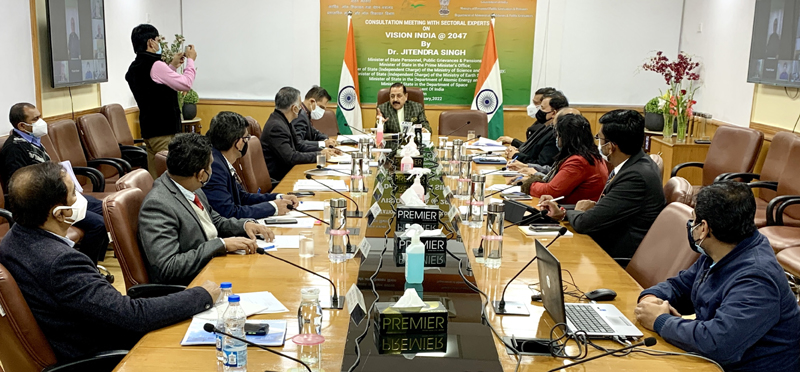
Excelsior Correspondent
NEW DELHI, Jan 15: Union Minister of State (Ind Charge) Science & Technology; Minister of State (Ind Charge) Earth Sciences; MoS PMO, Personnel, Public Grievances, Pensions, Atomic Energy and Space, Dr Jitendra Singh today said that India’s @2047 would have evolved beyond imagination. Not only are things moving fast , but the pace of this forward movement is much faster than ever before, which makes it very difficult to precisely visualise the exact shape of India that emerges 25 years from now. But one thing is certain, that when independent India turns 100, it will be the world’s Technological and Economic powerhouse.
Chairing the first ever meeting of Sectoral experts to deliberate on ‘Vision India @2047’ from the governance perspective, organised by Department of Administrative Reforms (DARPG), Dr Jitendra Singh said, several initiatives, policies, schemes and programmes during the last over 7 years have given rise to a new era, in what has been described as the dawn of New India, and the emergence of Atma Nirbhar Bharat. He said, if one looks back, as we formulate the Vision for governance, one has to recognize that to bring citizens and Government closer, digital institutions have to be created. He said, adopting 21st century management practices represents a significant challenge for Governments and it is with this objective that Prime Minister Narendra Modi has embarked on the ambitious Vision India @2047 initiative.
Dr Singh recalled that in his Independence Day address, Prime Minister Modi had said, “During the ‘AmritKaal’, we will give priority to next generation reforms. We will ensure that all the facilities like service delivery should reach citizens up to the last mile; it should reach the last person seamlessly, without hesitation or any kind of difficulty. For the overall development of the country, unnecessary interference by the Government and the government processes in the lives of the people has to be ended.”
Referring to PM’s exhortation from the ramparts of Red Fort on 15th August, 2021, DrJitendra Singh said India’s ‘CAN DO’ generation can achieve every goal imaginable. He quoted Modi as saying, “I believe that in 2047, on the occasion of celebrating 100 years of independence… whoever will be the Prime Minister after 25 years from today, when he will be unfurling the flag… I say this with confidence today that he or she shall be chronicling those accomplishments in his speech about which the country has taken a vow today… This is my firm belief of victory”.
The Minister pointed out that the Government has tried to ensure digital infrastructure as a core utility to every citizen by providing unique digital identity, access to common service centres and has provided thousands of services on demand by seamless integration of services across Departments/Ministries. Recalling the DARPG’s Regional Conference at Nagpur on ‘Improving Service Delivery’ in December 2019, he said, both State/ Central Governments have tried to ensure availability of services in real time by digital empowerment of citizens.
DrJitendra Singh said, the unprecedented scale at which several programmes have been implemented like One Nation One Ration Card, e-Office, CPGRAMS, Passport SevaKendras, e-Hospital reflect in the Government’s willingness to adopt ‘Building to scale Building to last’ approach where Reforms are deep rooted and long lasting.
Some of the eminent Sectoral experts who presented their views included Prabhat Kumar, former Cabinet Secretary, Sanjat Kothari, former CVC,Dr K. Radhakrishnan former ISRO Chairman, Prof Eroll D’ouza , Prof Himanshu Roy, Prof Abhay Karandikar, Prof Sachin Chaturvedi, Dr R. Balasubramanium, Prof Nirmalaya Bagchi, Dr C. Chandramauli, Dr Mahadeo Jaiswal and S.N. Tripathi.

